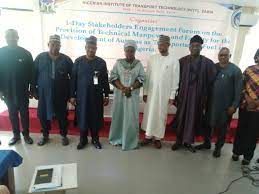Dr Mohammed Ibrahim, the Chairman of the National Gas Expansion Programme (NGEP), Office of the Minister of State for Petroleum Resources, has advocated for the optimal use of Liquefied Petroleum Gas (LPG) for transportation.
Ibrahim made the call on Tuesday in Abuja during his paper presentation at a stakeholders’ engagement forum, organised by Nigerian Institute of Transport Technology (NiTT), Zaria.
Theme of the event was “Auto gas as Alternative Fuel for Transportation in Nigeria”.
Ibrahim, who described LPG as autogas, said the use of autogas would improve the standard of living in the country.
“NGEP schemes are being driven to ensure that gas is optimally used to provide cleaner fuels for greener Nigeria, promote mitigation against climate change and secure Nigerian’s energy mix in the short to longer term basis.
He said “Accelerated optimisation of the extensive gas value chain is the key to unlocking the opportunities inherent in gas resource as an enabler for economic sustainability.
“Huge gas potential of Nigeria clearly offers an opportunity for effective support of economic sustainability of Nigeria.
“NGEP shall deliver all its strategic objectives through optimal performance of all project schemes of the programmes,” he said.
In her keynote address, Mrs Magdaline Ajoni, Permanent Secretary, Federal Ministry of Transportation, said the ministry would collaborate with other relevant stakeholders and the private sector to boost auto gas production in the country.
Ajoni, who was represented by Mrs Mercy Ilori, Director, Transport Planning and Coordination in the ministry, maintained that transportation remained a crucial key to the development of any nation.
“It is a sector that drives growth and development by linking different parts of the nation together to move products and creates job opportunities for the citizens.
She said with steady increase in the use of autogas, the federal government would ensure its sustainability.
According to her, autogas is the only fuel that can act as a bridge between existing oil habits and cleaner with less oil intensive future.
The permanent secretary said more hydrogen and less carbon in autogas makes things better for the planet.
In his goodwill message, Mr Michael Ohiani, the Director-General, Infrastructure Concession Regulatory Commission (ICRC), said effort is being strengthened toward provision of technical manpower and facility for the development of autogas as transportation fuel in Nigeria.
According to him, the forum was timely, especially with the current cost of fuel.
“Nigeria is indeed a blessed nation with various kinds of natural resources, that if put into use, could be sources of revenue generation toward the development of our beloved nation.
“NiTT came up with this brilliant initiative, to switching from using fossil fuel to autogas as transport fuel in Nigeria.
“It is worthy to mention here that NiTT has been engaging with ICRC on this project, as Public Private Partnership (PPP) process.
“We in ICRC support the initiative, it is a step in the right direction,” he said.
Contributing, Dr Danjuma Ismaila, the Director of Transport Technology Center at NiTT, said LPG is normally used as a fuel in internal combustion engines in vehicles and generators.
The director said Nigeria was yet to make significant use of autogas.
According to him, autogas is cheaper and affordable, safer, convenient, available, growing and air quality.
“LPG gas conversion project targets about 20 million vehicles, tricycle and generators creating jobs opportunities. It will relieve pressure on national grid and serve as affordable power source to household.
“Also, it will ease the demand for forex for the importation of petroleum product (about US$7Billion/annum), cushion the impact of subsidy removal on Petrol, and contribute to government’s vision of Zero emission by 2050 from Transport.
“Apart from cost saving and mitigating emission, LPG is cleaner and safer than petrol, and prolongs engine life span of vehicle. Engine oil and spark plugs need changing less often,” he said.
He said Nigerian motorists had enough incentives to switch to auto gas to power their vehicles.








